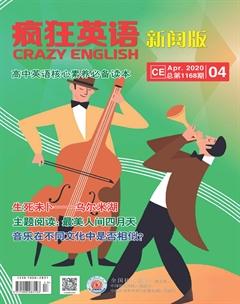林徽因
彭向梅

林徽因的一生就像一個传奇,她的出生,她的美丽,她的才华,她的经历,无一不令人感叹。
难词探意
1. generalist / d enr l st/ n. (有多方面知识和经验的)通才
2. emblem / embl m/ n. 徽章;符号
3. lobby / lɑ bi/ v. 对……进行游说
4. municipal /mju n s pl/ adj. 市政的;市的
5. sensational /sen se nl/ adj. 轰动的;耸人听闻的
6. phthisis /'ta s s/ n. 肺结核
Lin Huiyin, (1904—1955), was an outstanding female poet and architectural historian from the first half of the 20th century in China. She was an knowledgeable generalist who wrote about literature, arts, architecture and philosophy.
The favorite daughter of Mr Lin Changmin, a high-rank governor in the Beiyang Government, 16-year-old Lin Huiyin travelled with her father around Europe and the United States in the 1920s.
In 1928, Lin got married in Canada to Mr Liang Sicheng, son of China's famous politician and scholar, Liang Qichao. The couple had met while studying at Pennsylvania University in America.
On returning to China, Lin Huiyin started teaching architecture at Northeast University and then moved to Beijing's Qinghua University. She co-wrote the famous "Development Stages of Chinese Architecture" with her husband Liang Sicheng and another architect. She also contributed to the design for China's National Emblem and the Hero of the People's Monument in Beijing's Tiananmen Square.
Accompanying her husband to thousands of ancient Chinese architectural sites, most of which were in remote areas, she worked tirelessly to research China's architectural history. She and her husband lobbied hard to protect many of the old buildings in Beijing at a time when the municipal government was leveling many parts of the city for new construction.
Lin Huiyin's interests were very extensive and in addition to her work on architecture, she also wrote poems, essays, short stories and plays as well as translating works from English. She was well known in literary circles as hostess of one of the country's most famous literary salons in her home in Beijing's Zhongbu Hutong.
One of the more sensational parts of Lin Huiyin's life was her affair with romantic poet Xu Zhimo and she remains best known nowadays as an extremely beautiful female poet of the 1930s. As a symbol of independent women of the time, Lin Huiyin and her western education and fluent English gave her a broader outlook on life than most women of the time. Despite suffering from phthisis towards the end of her life, she never abandoned her work. One famous writer recalled once visited to the unwell Lin,
"She looked anything but a sick person and was wearing a horse riding dress. She never talked indirectly, or vaguely, but always straight to the point. Her criticisms never offended others and I was always amazed by her extraordinary understanding of the arts."
Reading check
Lin Huiyin was an outstanding female 1. and architectural historian from the first half of the 20th century. In the 1920s, she 2. with her father around Europe and America. In 1928, Lin married Mr Liang Sicheng in Canada. Back in China, she began teaching 3. at universities. She also 4. to the design of Chinas National Emblem and the Hero of the Peoples Monument in Beijings Tiananmen Square. Apart from her work in architecture, Lin wrote poems, essays, short stories and plays, and 5. works from English. Although she 6. from phthisis towards the end of her life, she never gave up her job.
Language study
Difficult sentence
Accompanying her husband to thousands of ancient Chinese architectural sites, most of which were in remote areas, she worked tirelessly to research China's architectural history.
【翻譯】__________________________
【点石成金】本句中,Accompanying her husband to thousands of ancient Chinese architectural sites为现在分词作伴随状语。most of which是用来引导定语从句的,先行词为Chinese architectural sites。

